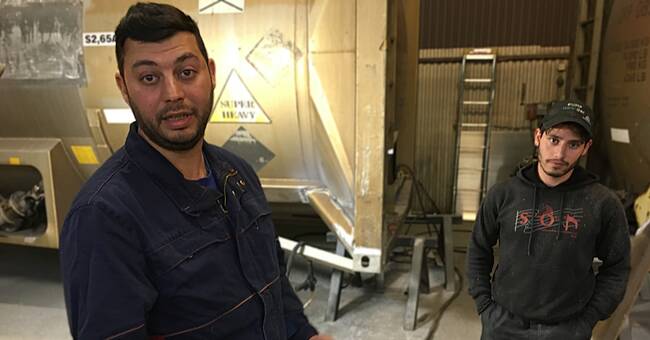Today, the company has two Syrians on the payroll.
It is 20 percent of the workforce in the small company that specializes in service and renovations of tanks and tankers.
Both are welders.
Swedish citizenship
One of the two we have told about before.
It is Safwan Alheik from Homs in Syria who came to Sweden with the large influx of refugees.
He came directly from the oil fields in the Middle East and is today one of the key people in the company.
- I feel great, we're told.
He has applied for Swedish citizenship and hopes for information from the Swedish Migration Board soon.
He has formed a family and gained stability in a life that was long marked by war and anxiety.
23-year-old co-worker
In addition, he has a colleague from Hama in Syria, 23-year-old Ahmad Alsamam, who is also a welder and workshop worker.
Ahmad first trained as a tiler but changed direction when there was a shortage of jobs in the construction industry.
Now he is one of ten employees in the small Njurunda company.
A permanent job was necessary in his case because the requirements for permanent residence permits were tightened.
The job in Njurunda resulted in a permanent residence permit two months ago and it was a relief, he says.
- Now I can start looking ahead without the fear of being forced to leave Sweden.
Now I am one hundred percent safe and can start thinking about family, houses and everything I want, says Ahmad Alsamam.
Stricter rules are criticized
Safwan Alheik believes that the new stricter rules are a concern.
He believes that it creates insecurity and difficulties for newcomers to create a future.
He believes that the uncertainty makes it difficult for many to focus on the language, job search and learning Swedish society.
- It is tough to demand adaptation and integration of people who at the same time live under the threat of leaving the country.
The uncertainty is not good for anyone, he says.
The match is broken
His boss Jan-Erik Iversen, who is the CEO of the company, also believes that matching is a continuing concern.
- The difficulty for me as an entrepreneur is to find those with the right skills that are out there.
The employment service and all institutions that work with these issues have failed to link the skills that come into the country with the skills needs that exist in the companies.
I personally thank my lucky star that I was lucky, he says.

